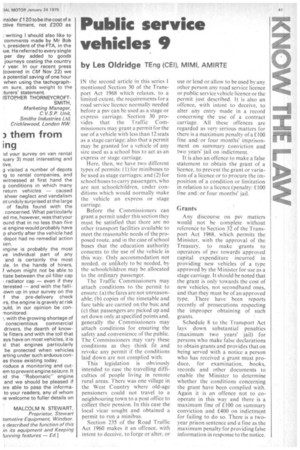Public service vehicles 9
Page 43

If you've noticed an error in this article please click here to report it so we can fix it.
by Les Oldridge TEng (CEO, MIMI, AMIRTE
IN the second article in this series I mentioned Section 30 of the Transport Act 1968 which relaxes, to a limited extent, the requirements for a road service licence normally needed before a psv can be used as a stage or express carriage. Section 30 provides that the Traffic Commissioners may grant a permit for the use of a vehicle with less than 12 seats as a stage carriage; also that a permit may be granted for a vehicle of any size used as a school bus to act as an express or stage carriage.
Here, then, we have two different types of permits: ( I) for minibuses to be used as stage carriages; and (2) for school buses to carry passengers, who are not schoolchildren, under conditions which would normally make the vehicle an express or stage carriage.
Before the Commissioners can grant a permit under this section they must be satisfied that there are no other transport facilities available to meet the reasonable needs of the proposed route, and in the case of school buses that the education authority consents to the use of the vehicle in this way. Only accommodation not needed, or unlikely to he needed, by the schoolchildren may be allocated to the ordinary passenger.
The Traffic Commissioners may attach conditions to the permit to ensure: (a) the fares are not unreasonable; (b) copies of the timetable and fare table are carried on the bus; and (c) that passengers are picked up and set down only at specified points and, generally the Commissioners may attach conditions for ensuring the safety and convenience of the public. The Commissioners may vary these cenditions as they think fit and revoke any permit if the conditions laid down are not coniplied with.
This legislation is obviously intended to ease the travelling difficulties of people living in remote rural areas. There was one village in the West Country where old-age pensioners could not travel to a neighbouring town to a post office to collect their pension. In this case the local vicar sought and obtained a permit to run a minibus.
Section 235 of the Road Traffic Act 1960 makes it an offence, with intent to deceive, to forge or alter, or use or lend or allow to be used by any other person any road service licence or public service vehicle licence or the permit just described. It is also an offence, with intent to deceive, to alter any entry made in a record concerning the use of a contract carriage. All these offences are regarded as very serious matters for there is a maximum penalty of a £100 fine and/or four months' imprisonment on summary conviction and two years' jail on indictment, • It is also an offence to make a false statement to obtain the grant of a licence, to prevent the grant or variation of a licence or to procure the imposition of a condition or limitation in relation to a licence (penalty; £100 fine and/or four months' jail.
Grants
Any discourse on psv matters would not be complete without reference to Section 32 of the Transport Act 1968, which permits the Minister, with the approval of the Treasury, to make -grants to operators of psv towards approved capital expenditure incurred in providing new vehicles of a type approved by the Minister for use as a stage carriage. It should be noted that the grant is only towards the cost of new vehicles, not secondhand ones, and that they must be of an approved type. There have been reports recently of prosecutions respecting the improper obtaining of such grants.
Schedule 8 to the Transport Act lays down substantial penalties (maximum two years' jail) for persons who make false declarations to obtain grants and provides that on being served with a notice a person who has received a grant must produce, for examination, books, records and other documents to enable the Minister to determine whether the conditions concerning the grant have been complied with. Again it is an offence not to cooperate in this way and there is a maximum fine of -£100 on summary conviction and £400 on indictment for failing to do so. There is a twoyear prison sentence and a fine as the maximum penalty for providing false information in response to the notice.




































































































